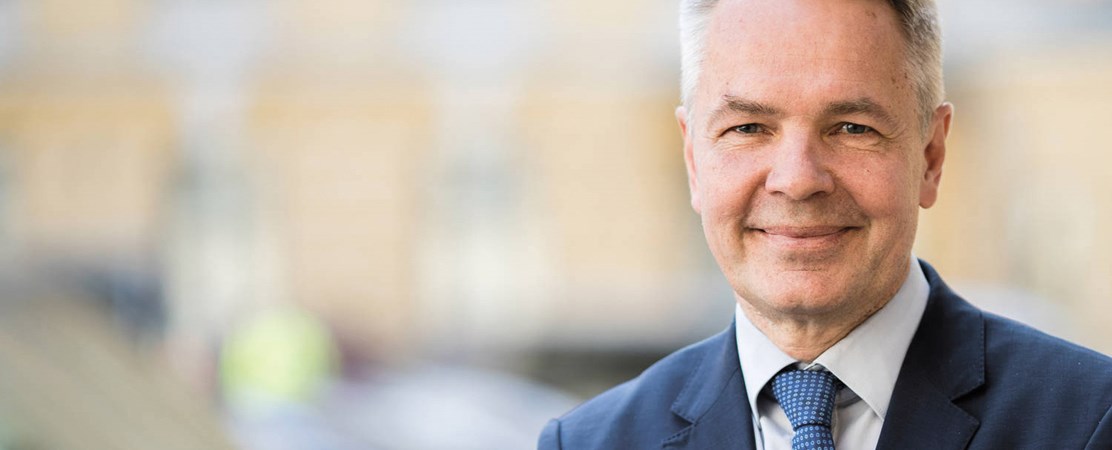Climate Action – A Need for Policy

By Pekka Haavisto, Minister for Foreign Affairs, Finland
We are witnessing the rapid spread of the coronavirus pandemic around the world. Unfortunately, this is not such a surprise – scientists have been warning for some time that epidemics will become more common as the climate changes. It is only one of the numerous negative impacts of global warming.
The accelerating speed of climate change is nowhere as visible as it is in our polar regions. Therefore, the Arctic and the Antarctic are at the center of international attention. Scientists are sparing no effort in trying to understand the changes and their impacts, as well as the interaction of the various processes underway. We already know a lot, but much remains uncertain.
The danger is, however, that in our quest for perfect knowledge, we may pass several tipping points after which action would be too late. We need urgent climate action immediately to meet the Intergovernmental Panel on Climate Change (IPCC) target of limiting global warming to 1.5 degrees. According to both the IPCC report and the Global Sustainable Development Report, humanity has about ten years for a complete paradigm shift. In the Arctic, the speed of climate change is even faster, and the consequences are already visible today.
As one of the eight Arctic states, and as one of the five countries in the world who are members of both the Arctic Council and the Antarctic Treaty, Finland works actively on the national and international levels in order to tackle climate change.
The aim of our new government program, guided by the United Nations’ 2030 Agenda for Sustainable Development and the Paris Agreement, is to transform Finland into a socially, economically and ecologically sustainable society by 2030. Our goal is to be the world’s first fossil-free welfare society. We are working to ensure that Finland is carbon neutral already by 2035 and carbon negative soon after that. We will achieve this by accelerating emissions reduction measures and by strengthening carbon sinks. We have already banned the use of coal for energy by 2029. We will also halve the domestic use of imported mineral oil, and phase out the use of fossil fuel oil in heating by 2030.
In my ministry, the Ministry for Foreign Affairs of Finland, we have tackled the challenge by mainstreaming climate considerations in all our policies – foreign and security, trade and development. Our climate-smart foreign policy promotes and supports the transition to low emissions and, in the long run, to carbon-neutral and climate-resilient societies globally.
Through our own ambitious climate targets, we try to spur other countries to do the same. We use climate diplomacy tools to spread the message and share our experiences. We promote positive climate, environmental and circular economy solutions, as well as carbon pricing and the phaseout of fossil fuel subsidies globally. Finland contributes to the European Union’s (EU) climate diplomacy which aims to persuade major emitters to adopt more ambitious climate policies. It is indispensable to encourage the world’s major economies to commit to more ambitious climate targets.
Similar to the global ravages of the coronavirus, the impacts of climate change do not recognize state borders. What happens somewhere else on the planet has especially strong effects on the polar regions and on the sensitive Arctic biosystem and environment. According to scientists, in some parts of the Arctic the temperature has risen 6.3 degrees Celsius during the past 30 years – twice as much as elsewhere on the planet. This has severe consequences not only for the Arctic countries but also for the entire planet. Therefore, international cooperation and joint solutions are needed also with non-Arctic actors.
In the Arctic region, the Arctic Council remains at the core of Arctic cooperation and at the heart of our efforts in curbing the effects of climate change. The Arctic Council working groups conduct expert work on many climate-related aspects deserving all our support and encouragement. In addition to focusing on the environment and climate change, the Arctic Council also does valuable work with regard to sustainable development.
The Arctic region is not a wilderness uninhabited but a home for people who hope for prosperity and a realistic chance of building a better future for themselves and their children. Bearing this in mind, encouraging businesses with environmentally friendly approaches is crucial for ensuring sustainable economic activity in the region. All our efforts in Arctic cooperation must be in respect of and in cooperation with indigenous and local communities.
Climate change is high on the agenda in the preparation of Finland’s new Arctic Strategy set to be completed in early 2021. In addition, during the Finnish Presidency of the EU in 2019, the European Council agreed to invite the High Representative and the Commission to continue to actively implement the EU’s Arctic policy and to initiate a process to update the EU’s 2016 Arctic Communication. We strongly support the EU in this work.
We need robust policies in order to make change happen. We need political choices in order to make sure we can create the changes we envision in a socially just way. In Finland, I believe our strongest suit is that our ambitious climate policies are based on academic research, and that the majority of Finns – including our industries, businesses, civil society and political parties – supports them. Acting together, it is possible to make the shift that provides people and our planet with a safe future.
UArctic plays an important role in bringing together knowledge, science and experience in the Arctic region. It is knowledge that we need, and knowledge can only be obtained through scientific methods. As Hippocrates famously put it: “There are, in effect, two things: to know and to believe one knows. To know is science; to believe one knows is ignorance.” Let us not remain ignorant. Let us act, and let us act now. The world cannot wait.
